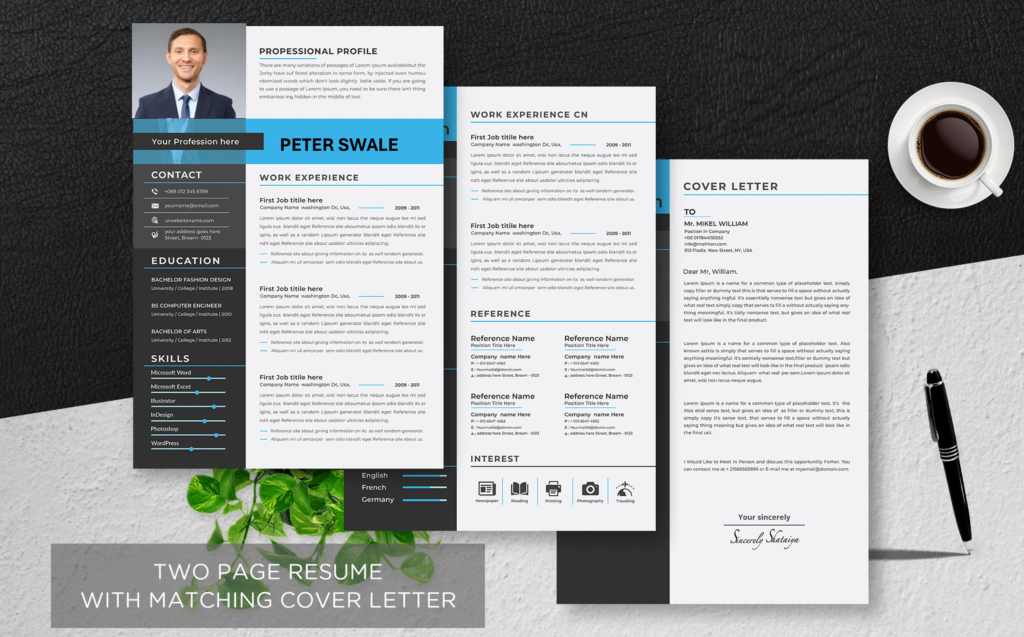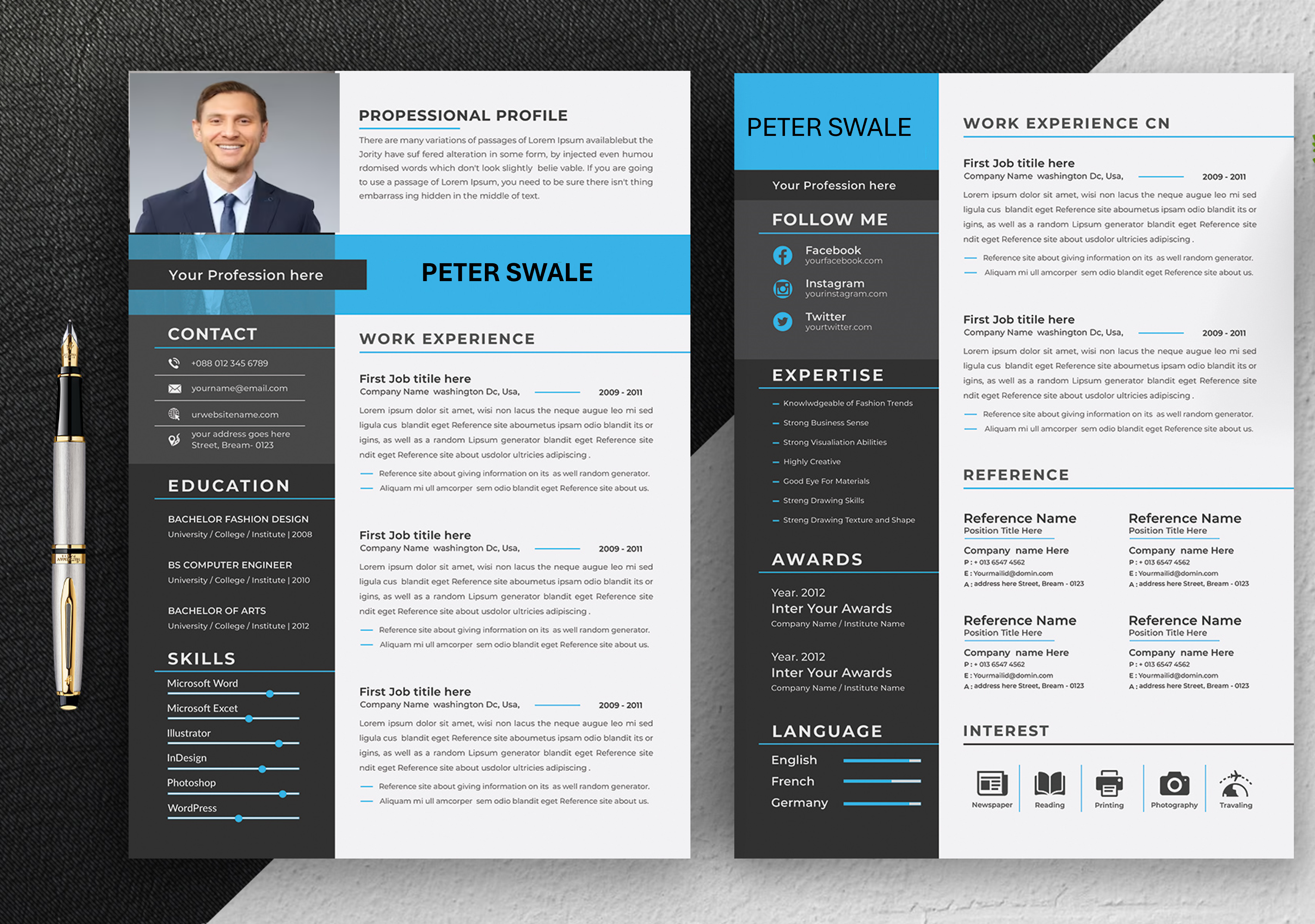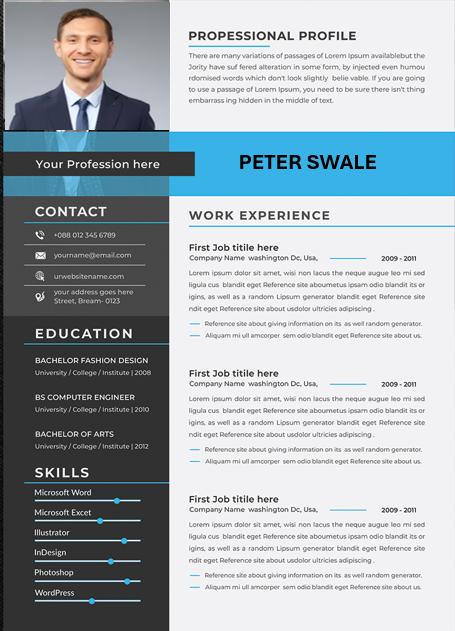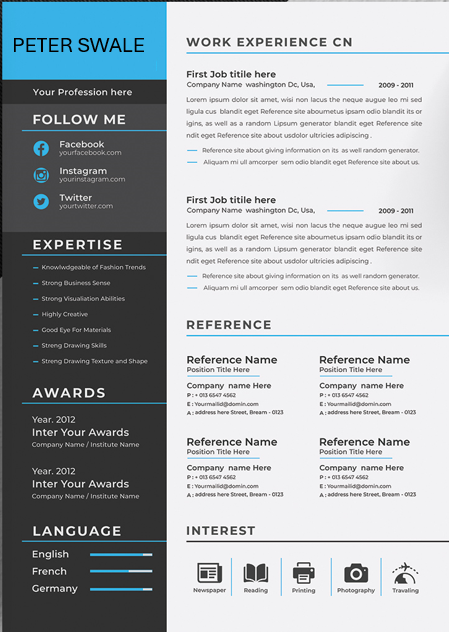Save time and Make a lasting impression with our fully Editable Agriculture Resume | CV
Download ATS-optimized resumes that yield favorable outcomes for a diverse range of positions, spanning from entry-level to professional and executive roles.
This Agriculture Resume/CV Template is well organized and structured Images, texts and colors are fully editable.
Beat the Applicant Tracking Systems with precision-crafted resumes.
Tailored to highlight your unique skills and experiences.
Targeted resumes for your dream positions.
For every purchase, the document comes with FREE tips to polish your interview skills and boost your confidence.
➡ Global Network: Partnered with +20 Resume Writing and Recruitment agencies across the USA, Canada, Australia, Europe and aFRICA.
📊 ATS Report: +80% Job Scan ATS reports for optimized resumes.
💼 Interview Mastery: Resources like Job Interview Guides, Thank You Letters, and a References Page for success.
🌟 Instant Download
✪ Resume Rewrite
✔ Modern, ATS-friendly design from scratch.
✔ Compelling summary targeting your next roles.
✔ Skills/Expertise section for increased visibility.
✪ Cover Letter
✔ One-page cover letter for applications.
✔ Convey why you’re the perfect fit.
✔ Demonstrate how your skills add value.
Transform your career with this limited-time offer
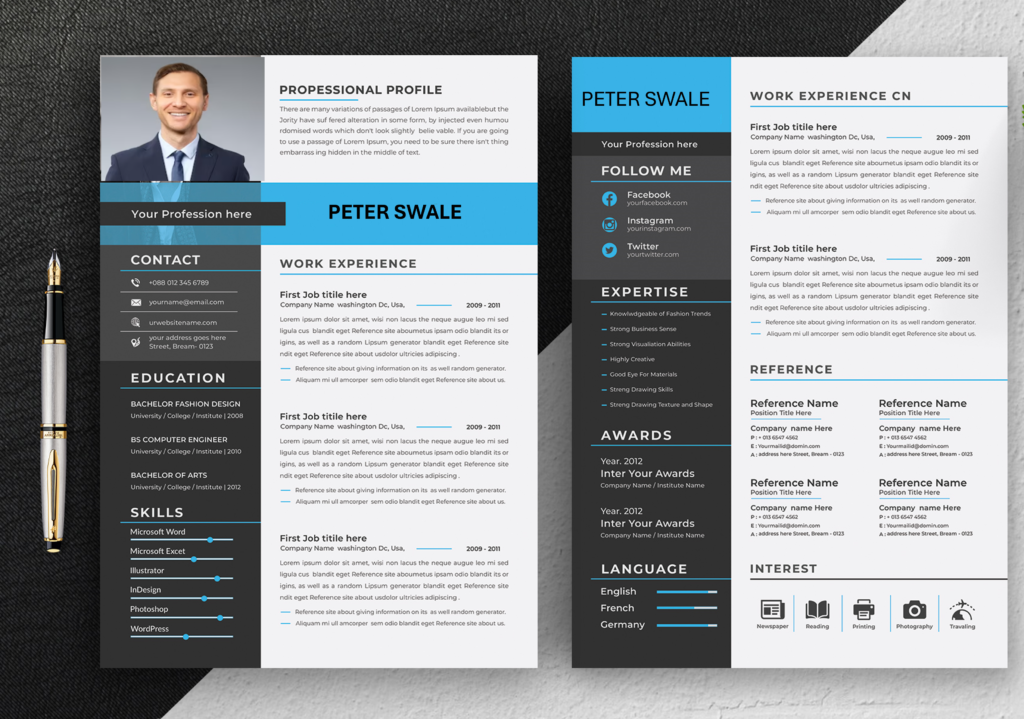
$2 USD
$ 25.00 USD
30-Day Money-Back Guarantee
About this Agriculture Resume:
Fully Editable
89 Users
Instant Download
MS Word, PDF, PSD, AI
Testimonial

4.9 star ratings
from over
1178 Users
Trade the stress of crafting your resume with confidence and clarity, empowering you to secure your dream job.
Agriculture Resume Templates FAQs
See our Agriculture resume examples here
Dedicated and results-driven agricultural professional with a Bachelor’s degree in Agricultural Science and over 5 years of experience in crop management and sustainable farming practices. Skilled in soil analysis, irrigation management, and pest control techniques. Proven track record of optimizing crop yields and implementing innovative agricultural technologies. Strong knowledge of industry regulations and commitment to environmental stewardship. Seeking to leverage expertise in agricultural production to contribute to the success of a progressive farming operation.
An effective agriculture resume should be well-organized, visually appealing, and tailored to highlight your relevant skills, experience, and achievements. Here are some key elements to consider when formatting your Agriculture resume:
-
Header:
- Name
- Contact Information (Phone Number, Email Address)
- Location (City, State)
-
Summary/Objective:
- Brief overview of your background, skills, and career goals in the agriculture industry. Tailor this section to highlight your specific strengths and objectives.
-
Education:
- Bachelor’s/Master’s Degree in Agricultural Science, Crop Science, Agronomy, Horticulture, or related field.
- Name of Institution
- Location of Institution
- Graduation Date
-
Professional Experience:
- List your relevant work experience in reverse chronological order.
- Include job titles, company names, locations, and dates of employment.
- Use bullet points to describe your responsibilities and achievements in each role, focusing on tasks related to agriculture, such as crop management, livestock care, irrigation, pest control, etc.
-
Skills:
- Highlight key skills relevant to the agriculture industry, such as:
- Crop management
- Soil analysis
- Irrigation techniques
- Pest and disease control
- Equipment operation and maintenance
- Sustainable farming practices
- Research and data analysis
- Compliance with industry regulations
- Tailor your skills section to match the requirements of the job you’re applying for.
- Highlight key skills relevant to the agriculture industry, such as:
-
Certifications and Training:
- Include any relevant certifications or training programs you’ve completed, such as:
- Pesticide applicator license
- Agricultural safety training
- Equipment operation certifications
- Sustainable agriculture workshops
- Provide the name of the certification/training program, issuing organization, and date obtained.
- Include any relevant certifications or training programs you’ve completed, such as:
-
Professional Affiliations:
- Optional section to list memberships in relevant agricultural organizations or associations, such as the National Farmers Union, American Society of Agronomy, etc.
-
Additional Sections (Optional):
- Volunteer Work: Any relevant volunteer experience related to agriculture.
- Awards and Honors: Recognition for achievements in the field of agriculture.
- Languages: Fluency in languages other than English may be beneficial, especially for international agriculture positions.
-
References:
- You can include “References available upon request” at the bottom of your resume. Make sure you have a separate list of references prepared if requested by the employer.
-
Formatting Tips:
- Use a clean and professional font (e.g., Arial, Calibri) with a font size of 10-12 points.
- Maintain consistent formatting throughout the resume, including bullet points, margins, and spacing.
- Keep the resume length to one or two pages, focusing on the most relevant information.
By following this structure and customizing the content to match your own experiences and qualifications, you can create a well-organized and effective Agriculture Resume.
Our resume writing service has helped applicants land more interviews and get hired faster.
Other Questions On Agriculture Resume Services
The main goal of a resume is to secure interviews for you. If you’re not getting the desired responses or interview invitations from your job applications, chances are your resume isn’t effectively showcasing your qualifications. Our resume writing services are tailored to align your experience, skills, and strengths with your target positions, ensuring you stand out to potential employers.
The objective is to convey your value to potential employers effectively. Usually, clients experience a significant surge in interview requests with a professionally crafted, targeted resume.
A professional Agriculture resume writer can help you get the job you want in several ways:
-
Tailored Content: They will customize your resume to highlight your specific skills, experiences, and achievements relevant to the agriculture industry. This customization ensures that your resume effectively showcases your qualifications for the specific job you’re targeting.
-
Keyword Optimization: Professional resume writers are familiar with industry-specific keywords and terminology used in the agriculture sector. They will strategically incorporate these keywords into your resume to improve its visibility to applicant tracking systems (ATS) and increase your chances of getting noticed by hiring managers.
-
Formatting and Design: A well-designed resume that is visually appealing and easy to read can make a positive impression on employers. Resume writers will ensure that your resume has a professional layout, consistent formatting, and appropriate use of white space to enhance readability and overall presentation.
-
Highlighting Achievements: Professional resume writers know how to effectively highlight your accomplishments and contributions in previous roles. They will craft compelling bullet points that showcase your impact on crop yields, livestock production, sustainability initiatives, or other relevant areas of expertise within the agriculture field.
-
Staying Updated: The agriculture industry is constantly evolving with new technologies, practices, and regulations. Professional resume writers stay informed about industry trends and changes, ensuring that your resume reflects the latest developments and best practices in agriculture.
-
Personalized Guidance: A professional resume writer can provide personalized guidance and advice throughout the resume writing process. They can help you identify your strengths, address any weaknesses, and tailor your resume to position you as a strong candidate for the jobs you’re pursuing.
-
Cover Letter Writing: In addition to resume writing, many professional resume writers also offer cover letter writing services. A well-crafted cover letter tailored to the specific job and employer can further enhance your application and demonstrate your interest and enthusiasm for the position.
Overall, working with a professional Agriculture resume writer can increase the effectiveness of your job search efforts, helping you stand out from the competition and land the job you want in the agriculture industry.
Optimizing your LinkedIn profile can significantly increase your visibility to recruiters and potential employers. Here are some tips to help you optimize your LinkedIn profile and improve your chances of being found by recruiters:
-
Complete Your Profile: Fill out all sections of your LinkedIn profile, including your summary, work experience, education, skills, and interests. A complete profile provides more information for recruiters to assess your qualifications and suitability for roles.
-
Use Keywords Strategically: Incorporate relevant keywords throughout your profile, including in your headline, summary, job titles, and skills section. Use keywords that are commonly used in your industry and by recruiters searching for candidates with your skill set.
-
Craft a Compelling Headline: Your LinkedIn headline appears prominently below your name and should effectively summarize your professional identity and expertise. Use keywords related to your desired role or industry to attract the attention of recruiters.
-
Write a Captivating Summary: Use the summary section to provide a brief overview of your background, skills, experience, and career goals. Showcase your unique value proposition and highlight your key achievements and strengths. Use a conversational tone to engage readers and make your profile more appealing.
-
Highlight Your Accomplishments: In the experience section, focus on highlighting your accomplishments and contributions in each role rather than just listing your job responsibilities. Use quantifiable achievements and metrics whenever possible to demonstrate your impact.
-
Add Multimedia Content: LinkedIn allows you to enhance your profile with multimedia content such as links to articles, presentations, videos, or projects. Incorporate relevant multimedia content to showcase your work and provide additional context to recruiters.
-
Request Recommendations: Request recommendations from colleagues, managers, or clients who can vouch for your skills and professionalism. Authentic recommendations add credibility to your profile and reinforce your qualifications.
-
Grow Your Network: Connect with professionals in your industry, including recruiters, hiring managers, and colleagues. Building a strong network expands your visibility and increases the likelihood of being discovered by recruiters.
-
Engage with Content: Like, comment on, and share relevant posts and articles to demonstrate your expertise and engage with your network. Active engagement helps to increase your visibility and establish your presence as a thought leader in your field.
-
Enable Open to Work Feature: LinkedIn offers an “Open to Work” feature that allows you to signal to recruiters that you are actively seeking new opportunities. Enable this feature in your profile settings to make it easier for recruiters to identify you as a potential candidate.
By implementing these strategies, you can optimize your LinkedIn profile and increase your visibility to recruiters, ultimately improving your chances of being contacted for relevant job opportunities.
A successful Agriculture resume typically includes the following components:
-
Header:
- Name
- Contact Information (Phone Number, Email Address)
- Location (City, State)
-
Summary/Objective:
- Brief overview of your background, skills, and career goals in the agriculture industry. Tailor this section to highlight your specific strengths and objectives.
-
Education:
- Bachelor’s/Master’s Degree in Agricultural Science, Crop Science, Agronomy, Horticulture, Animal Science, Environmental Science, or related field.
- Name of Institution
- Location of Institution
- Graduation Date
-
Professional Experience:
- List your relevant work experience in reverse chronological order.
- Include job titles, company names, locations, and dates of employment.
- Use bullet points to describe your responsibilities and achievements in each role, focusing on tasks related to agriculture, such as crop management, livestock care, irrigation, pest control, soil conservation, research, etc.
-
Skills:
- Highlight key skills relevant to the agriculture industry, such as:
- Crop management techniques
- Soil analysis and fertility management
- Irrigation system design and management
- Pest and disease control methods
- Livestock care and management
- Sustainable farming practices
- Equipment operation and maintenance
- Data analysis and research skills
- Knowledge of industry regulations and compliance standards
- Tailor your skills section to match the requirements of the job you’re applying for.
- Highlight key skills relevant to the agriculture industry, such as:
-
Certifications and Training:
- Include any relevant certifications or training programs you’ve completed, such as:
- Pesticide applicator license
- Certified Crop Advisor (CCA)
- Certified Professional Agronomist (CPAg)
- Certified Professional Soil Scientist (CPSS)
- Certified Agricultural Consultant (CAC)
- Agricultural safety training
- Equipment operation certifications
- Sustainable agriculture workshops
- Provide the name of the certification/training program, issuing organization, and date obtained.
- Include any relevant certifications or training programs you’ve completed, such as:
-
Professional Affiliations:
- Optional section to list memberships in relevant agricultural organizations or associations, such as the National Farmers Union, American Society of Agronomy, Soil and Water Conservation Society, etc.
-
Additional Sections (Optional):
- Volunteer Work: Any relevant volunteer experience related to agriculture.
- Awards and Honors: Recognition for achievements in the field of agriculture.
- Languages: Fluency in languages other than English may be beneficial, especially for international agriculture positions.
-
References:
- You can include “References available upon request” at the bottom of your resume. Make sure you have a separate list of references prepared if requested by the employer.
-
Formatting Tips:
- Use a clean and professional font (e.g., Arial, Calibri) with a font size of 10-12 points.
- Maintain consistent formatting throughout the resume, including bullet points, margins, and spacing.
- Keep the resume length to one or two pages, focusing on the most relevant information.
By including these components and customizing the content to match your own experiences and qualifications, you can create a successful Agriculture resume that effectively showcases your expertise and suitability for agricultural roles.
If you’re looking for a “professional agriculture resume writer near you”, here are 3 reasons when it makes perfect sense to do so.
- You’re currently employed and seeking new job opportunities.
- Your resume requires refinement Not Writing From Scratch
-
You’re in need of securing employment swiftly.

